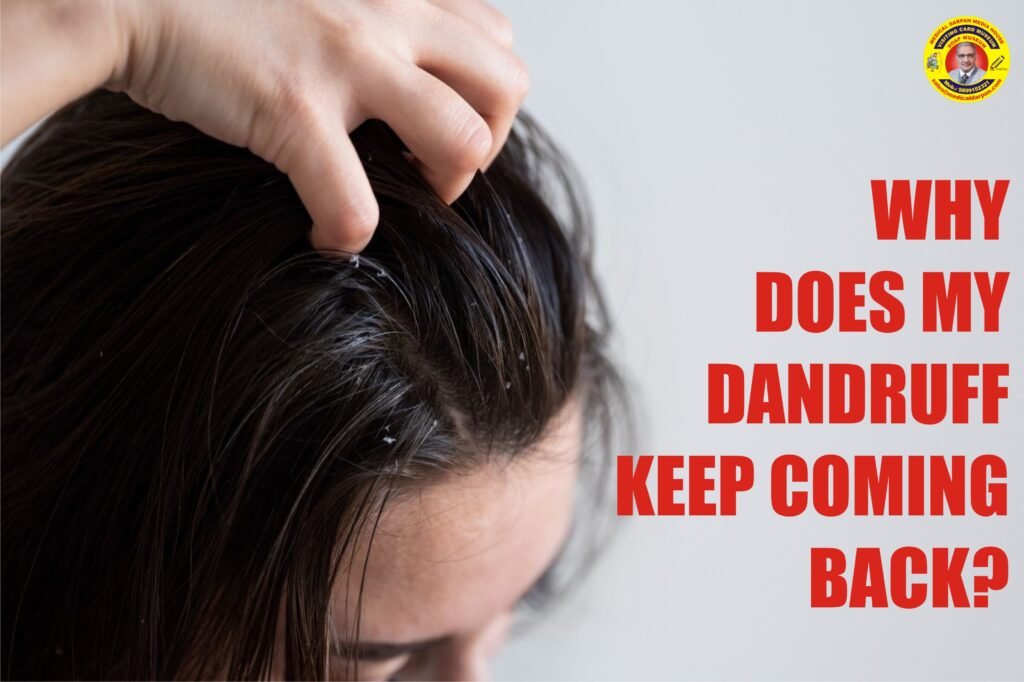
Are you dealing with repetitive dandruff woes? It can be frustrating and embarrassing to spot those snowflakes or yellow clumps on your scalp every few weeks. Many adults and even kids suffer from dandruff issues and related discomforts, such as itchiness or dried skin. If you are wondering why Dandruff returns, read the guide below.
Dandruff is primarily dried snowflakes clustered on the scalp and root hair, sometimes even seen as yellow clumps. It is a persistent problem for people, as the shedding of Dandruff on dark-coloured clothes or visibility during hairstyles makes people feel awkward.
The existence of Dandruff is much older than you can even imagine. A few extracts by Greek physicians also prove the dandruff problems in that era, and it’s interesting to think what they must have been doing to cope with dandruff concerns then. Getting back to the topic!
Dandruff takes a toll on the mind, as its recurrence is annoying and unstoppable. Though removing Dandruff with medicated shampoos or oils is possible, the worst part is that it gets back as soon as you stop the treatment. Before knowing ways to prevent Dandruff, it is essential to familiarize yourself with its primary causes.
Main culprits resulting in hair dandruff are listed below:
This is an epic problem for many men and women! Despite following all hair care regimes for dandruff prevention, it tends to come back. Here’s a detailed breakdown of why Dandruff keeps reoccurring in most cases:
– Ingredients in Shampoo
Dandruff is most likely to return if the active ingredients of your shampoo are unable to reach their target and aren’t used in the correct quantity. Killing the yeast present on the scalp is essential. Though the anti-dandruff or medicated anti-fungal shampoos act on the skin surface, they cannot reach the pores or hair follicles to remove fungi altogether.
Now you precisely know that the roots of Dandruff never get eliminated, and that’s why it is bound to reverse in most cases. Maybe scientific advancements can develop stronger formulations that penetrate the hair follicles deeply and permanently remove Dandruff.
– Conditioner Usage
People commonly use a conditioner after shampoo to get the desired hair lustre and bounce. However, the hair-smoothing elements in conditioners might wash off the anti-dandruff shampoo ingredients, thus giving a comfortable bed for yeast to develop. It is advisable to skip conditioner use after washing hair with the anti-dandruff shampoo and avoid applying any kind of hair oil or serums as well to ensure complete dandruff removal from the scalp.
– Skin Conditions
Acne or pimples are also related to Dandruff, as they contain Malassezia fungi as a crucial factor. Dense dandruff accumulation might also result from skin conditions like acne or eczema in many adults.
Men and women with Dandruff close to the hairline in well-defined patches can result in scalp psoriasis. Both these issues can coexist together and are known as seboposriasis. Individuals struggling with skin conditions are prone to dense dandruff accumulation in their scalp.
– Yeast Overgrowth
The primary cause of dandruff development on the scalp is the yeast fungus known as ‘Malassezia.’ It dwells on the scalp and rigorously multiplies the count of snowflakes. When the yeast overgrowth worsens, the recurrence of Dandruff might go beyond control, and it gets tricky to prevent it even with anti-dandruff shampoos. In this case, seeking the expert opinion of a dermatologist may be helpful.
– Dry Skin
Have you experienced more dandruff in winter? It is because skin tends to dry out in cold weather, thus allowing more yeast-like fungi on the scalp. Fewer hair wash sessions also contribute to dandruff accumulation, further worsening the situation. Men or women with dried skin problems are more prone to Dandruff coming back again and again.
– Hormonal Changes
Our body experiences a myriad of hormonal changes every day that impact the skin, body, appearance, and even hair. Scalp itchiness or hair damage might also result in recurring dandruff cycles, and only anti-dandruff shampoos can help you overcome them. Repeating the use of such shampoos weekly might guard you against Dandruff worsening to a certain extent.
If you continue to observe symptoms despite treatment for Dandruff, it is ideal to consult a dermatologist and get detailed check-ups without delay.
Hopefully, we’ve at Medical Darpan helped you find ways to get rid of dandruff embarrassment and the causes behind it. One thing is for sure: You can’t get rid of Dandruff permanently, so it is better to include improved shampoos with active ingredients that prove effective. Do not use these shampoos more than once a week, as few microbes on your scalp are crucial for the skin. Maintaining the right balance can restore your hair’s health.
If you’re suffering from excessive Dandruff and itchiness leading to scalp wounds, it is recommended that you visit a dermatologist for a detailed examination. There might be other compounding reasons for it as well. For further details or information, kindly message us in the comments section below, and we’ll surely get back to you soon.
Take care of your hair health, and come back for more!